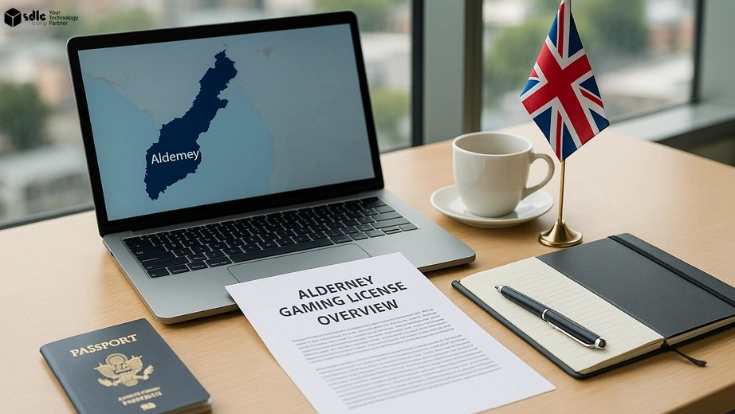Introduction
The United Kingdom is home to one of the most robust and respected gambling markets in the world. Whether you plan to launch an online casino, a sports betting platform, or supply innovative gaming software, operating in the UK requires securing a Gambling License issued by the UK Gambling Commission (UKGC).
A UK Gambling License is more than a legal requirement it’s a mark of credibility, player trust, and commitment to high standards of fairness and responsibility. However, the application process can be complex, with stringent compliance obligations, technical standards, and detailed documentation to prepare.
What Is a Gambling License?
Before starting your application, it’s essential to understand the legal framework governing gambling in the UK.
Core Legislation:
Gambling Act 2005: The primary law establishing licensing requirements, regulatory objectives, and the UKGC’s powers.
Licensing Conditions and Codes of Practice (LCCP): Sets out operational rules covering AML, responsible gambling, fair treatment, and advertising.
Money Laundering Regulations 2017: Mandates robust procedures for player verification, monitoring, and suspicious transaction reporting.
Remote Gambling and Software Technical Standards (RTS): Technical controls to ensure software fairness and integrity.
Regulatory Principles:
- Keep gambling free of crime and disorder.
- Ensure gambling is conducted fairly and openly.
- Protect children and vulnerable persons from harm.
If you’re a non-UK business, you must also understand the extra requirements for remote operators serving the UK market, such as appointing a local representative and complying with UK taxation.
Step 1: Understand the Legal Landscape in the UK

Before starting your application, it’s essential to understand the legal framework governing gambling in the UK.
Core Legislation:
Gambling Act 2005: The primary law establishing licensing requirements, regulatory objectives, and the UKGC’s powers.
Licensing Conditions and Codes of Practice (LCCP): Sets out operational rules covering AML, responsible gambling, fair treatment, and advertising.
Money Laundering Regulations 2017: Mandates robust procedures for player verification, monitoring, and suspicious transaction reporting.
Remote Gambling and Software Technical Standards (RTS): Technical controls to ensure software fairness and integrity.
Regulatory Principles:
- Keep gambling free of crime and disorder.
- Ensure gambling is conducted fairly and openly.
- Protect children and vulnerable persons from harm.
If you’re a non-UK business, you must also understand the extra requirements for remote operators serving the UK market, such as appointing a local representative and complying with UK taxation.
Step 2: Decide the Type of Game You Want to Offer

The next step is to define precisely what kind of gambling activities you will operate. This decision impacts:
- Which licenses you must apply for.
- Your technical compliance obligations.
- Tax liabilities.
Common UK Gambling Categories:
Online Casino Games:
Slots, blackjack, roulette, baccarat, poker.
Requires a Remote Casino License plus a Software License if you develop your own games.
Sports Betting:
Fixed-odds and pool betting (pre-match and live).
Requires a Remote Betting License.
Bingo:
Online or in-person bingo operations.
Needs a Bingo Operating License.
Lotteries and Prize Competitions:
Raffles and draws with real prizes.
Special licensing or exemptions may apply.
Gambling Software Supply:
If you create, adapt, or supply gambling software, you need a Gambling Software License UK.
Step 3: Choose Your Licensing Jurisdiction and Approach

Under the UK Gambling Act, if you target UK players, you must hold a UK license, regardless of where your servers or business are based.
Key Decisions:
Remote vs. Non-Remote:
Remote licenses are for online or telephone gambling.
Non-Remote licenses are for physical premises.
Domestic vs. Overseas Entity:
UK Limited Company: Simplifies tax and compliance.
Overseas Company: Must appoint a UK representative for regulatory purposes.
Advertising Rules:
Only licensed operators can legally advertise gambling services in the UK.
Tax Considerations:
- Remote Gaming Duty: 21% of Gross Gambling Yield (GGY).
- Betting Duty/Casino Duty: Apply depending on activities.
Step 4: Register a Business Entity in the UK

Before applying for a license, you must register a legal entity capable of meeting regulatory and tax obligations.
Options:
- UK Limited Company: Most operators prefer this for credibility and simplicity.
- Overseas Entity: Must comply with extra disclosure and appoint a UK representative.
Registration Requirements:
Directors’ and beneficial owners’ details.
Disclosure of any criminal convictions, regulatory sanctions, or financial problems.
Clear documentation of corporate governance.
The UKGC will assess whether your business can demonstrate honesty, integrity, and competence.
Step 5: Prepare Your License Application Package

This is the most critical phase of your gambling license application UK.
Required Documents:
Business Plan:
Clear description of your gambling products.
Marketing strategies and target markets.
Risk assessments for fraud and player protection.
Financial Forecasts and Funding Evidence:
12–36 months projections showing financial sustainability.
Proof of available capital and funding sources.
Anti-Money Laundering and KYC Policies:
Detailed AML framework meeting UK requirements.
Know Your Customer (KYC) procedures for player verification.
Responsible Gambling Measures:
Self-exclusion and deposit limit tools.
Links to support organizations.
Personal Management Licenses (PML):
Key management staff must submit individual applications.
Technical Documentation:
Software testing reports.
Platform architecture diagrams (if applicable).
Step 6: Submit Your Application to the UK Gambling Commission

The Process:
Create an account and complete the operator application form.
Upload supporting documents, including business plans, policies, and personal disclosures.
Assign responsible persons and submit PML applications.
Confirm application fee based on your estimated GGY.
Pay securely via the online system.
Timeline:
- Average processing time is 12–16 weeks.
- Complex structures or missing information can extend this period.
Step 7: Pay the Application & Licensing Fees

Your fees depend on your projected Gross Gambling Yield (GGY), the total value of bets minus winnings.
Application Fees:
Range from £5,000 for small operators to over £25,000 for large enterprises.
Annual Fees:
Payable after your license is approved and renewed yearly.
Additional Costs:
Technical testing by certified labs.
Responsible gambling contributions.
Professional advice and legal fees.
Step 8: Undergo Compliance, Technical & Background Checks

This stage involves in-depth scrutiny to confirm your suitability for a UK Gambling License.
What the UKGC Checks:
Personal Management License (PML) Approvals:
Verifies the honesty and competence of key staff.
Criminal Record and Sanctions Screening:Directors and controllers must pass background checks.
Financial Due Diligence:Ensures your business has legitimate funding and no ties to crime.
Technical Standards Compliance:Software and platforms must meet UK Remote Technical Standards (RTS).
Expect the UKGC to request clarifications or additional documentation. A transparent and cooperative approach speeds up approval.
Step 9: Receive Your UK Gambling License

Upon successful completion of all reviews, the UKGC will issue your license.
Notification:
You’ll receive an email and formal confirmation.
License Certificate:
You must display your license number on your website and communications.
Important:
Operating without this final authorization is illegal and carries heavy penalties.
Step 10: Maintain Ongoing Legal & Operational Compliance

Your compliance obligations don’t end once you have your license. To protect your business and your players:
Annual Regulatory Returns:
Submit detailed reports on revenue, player activity, and AML compliance.
AML and KYC Monitoring:
Regularly review player transactions and update verification records.
Responsible Gambling:
Maintain and improve self-exclusion and player protection measures.
Audits and Inspections:
The UKGC can conduct reviews at any time.
License Renewal:
Pay annual fees and confirm ongoing suitability.
Receive expert guidance at every stage of your gaming license journey from documentation to approval. Our legal and compliance specialists make the process seamless across top jurisdictions. Need assistance? Talk to our team
International Comparison: Why the UK?
Here’s how the UK Gambling License compares to other popular jurisdictions:
| Jurisdiction | Setup Costs | Reputation | Tax | Compliance |
|---|---|---|---|---|
| UK | High | Excellent | 21% GGY | Very Strict |
| Malta | Medium | High | 5% GGR | Strict |
| Gibraltar | Medium | High | 1% GGY (cap applies) | Strict |
| Isle of Man | Medium | High | 1.5% GGY | Strict |
Advantages of UK License:
Globally recognized.
High player trust.
Strong payment provider support.
Considerations:
More costly.
Complex compliance obligations.
Tips to Get Your UK Gambling License Faster
Hire Experienced Advisors:
Avoid delays by working with compliance specialists.
Prepare Thorough Documentation:
Incomplete applications are the #1 cause of delays.
Be Transparent:
Disclose all beneficial owners and funding sources.
Use Accredited Testing Labs:
Pre-certify your software and platforms.
Stay Informed:
Follow updates on the UK Gambling Commission website.
Future of Gambling in the UK
The UK gambling market is dynamic. Operators should be aware of:
Regulatory Reforms:
The Gambling Act White Paper is introducing affordability checks, stake limits, and new compliance expectations.
Responsible Gambling Trends:
Technology to detect problem gambling is becoming mandatory.
Crypto Considerations:
The UKGC takes a cautious approach to cryptocurrency payments.
Also Read: How to Start an Online Casino in UK?
Conclusion: Your Gateway to the UK Gambling Market
Acquiring a UK Gambling License is a rigorous but rewarding journey. This guide provides everything you need to navigate the application process, comply with legal requirements, and launch your gambling business with confidence.
SDLC Corp helps you secure a UK Gambling License with complete support for company setup, compliance, and UK Gambling Commission applications, so you can launch your gaming business legally and confidently.
FAQ's
Who needs a UK Gambling License?
Any business offering gambling services like online casinos, betting, bingo, or gaming software to UK consumers must hold a UK Gambling License issued by the Gambling Commission.
How long does it take to get a UK Gambling License?
On average, the process takes 12–16 weeks, depending on your application’s complexity and how quickly you provide complete documentation.
What does a UK Gambling License cost?
Application fees start from about £5,000 and can exceed £25,000, plus annual fees based on your Gross Gambling Yield (GGY).
Can overseas companies apply?
Yes, but you must appoint a UK representative and fully comply with UK regulations, including tax and advertising rules.
What documents are required for the application?
You’ll need a business plan, AML/KYC policies, financial forecasts, personal disclosures for key staff, and evidence of funding.
Can SDLC CORP handle end-to-end development?
Yes, SDLC CORP handles end-to-end development, from concept to deployment. We cover design, coding, testing, and post-launch support for complete project delivery.





